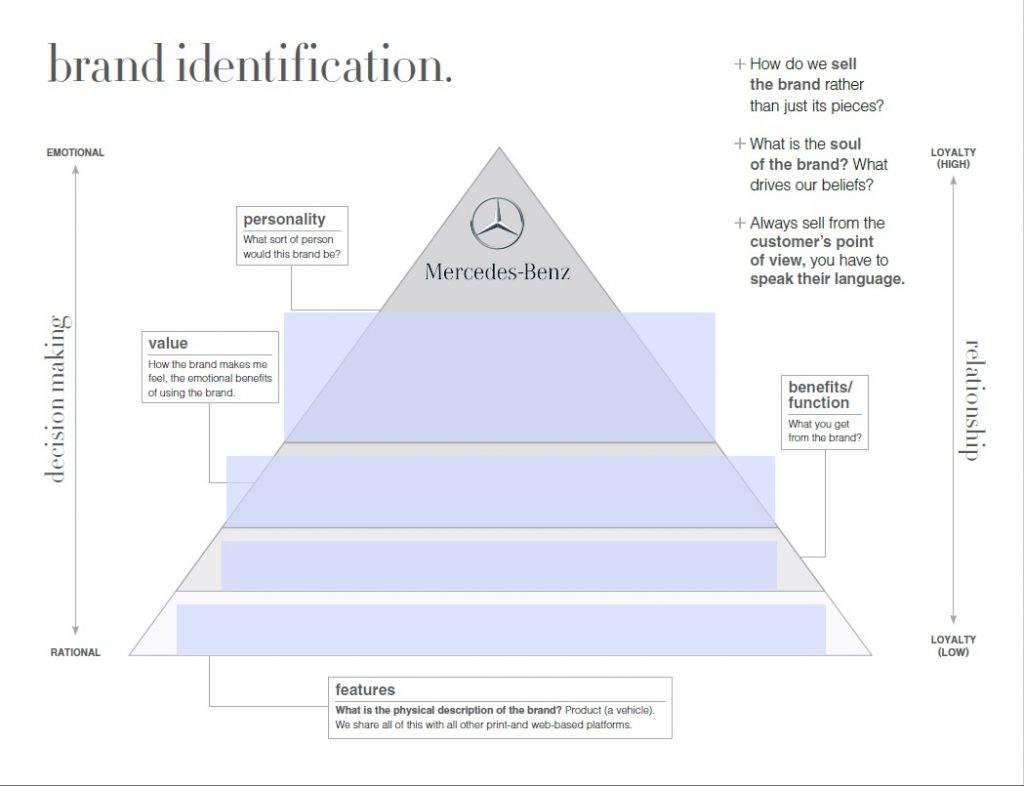
We don’t drive cars, we drive BMWs. We don’t stop for coffee, we stop for Starbucks. We wear Armani and carry Dolce&Gabbana. We sip on Belvedere or Grey Goose. We don’t drink water, we drink Evian or Fiji.
If the world can find a way to brand water, just imagine what you can do with your talents!
Which begs the question: Are you a brand? Do you think of yourself that way? You should! And in today’s world, you need to. We live in a world of brands. They surround us. They influence us. They often make us do things we probably shouldn’t do. How can you do a better job of making your brand apparent to customers—and not just that, but making them so loyal that they will never buy from anyone else? By understanding your value proposition and brand personality.
It’s Not About What You Do
We often get caught up in talking about what we do. We design rooms. We create beautiful window treatments. Brand marketing is different. It’s not about what we do, it’s about who we are and what we stand for. Your brand is a relationship with your client, vendors and associates.
Most top brands think of themselves as a brand personality because they want their image to attract people of similar personalities. Consider the relationship between Harley-Davidson and its customer base. The personal relationship is so strong, so compelling, the customer is willing to tattoo themselves with the Harley-Davidson name!
When we think of Apple, do we think of a little black plastic box? No. We think about easy communications and the world at our fingertips. With Nike, it’s not about the sneakers, it’s about winning and victory. Brand marketing is also not about the physical.
So what do you want people to think about when they hear your brand’s name? What you do is provide services to clients. But what’s above the basic service—and what you should focus on—is your brand personality. If you were to run an ad in a magazine but weren’t allowed to show any product, what would it say?
Brands are built on two basic principles: value proposition and brand personality. A value proposition is the unique promise you make customers about what services or features they can expect from your brand. The relationship between you and your client is strengthened by value propositions like trust and reliability.
Ask yourself: What truly distinguishes you from your other hundred competitors? What value do you provide that separates you, differentiates you from your competition? By value, I don’t mean faster delivery. That’s what you do. Value comes in the form of an expectation, an intangible and emotional relationship you and your client have.
Exercise: The Brand Pyramid

Combining value proposition and brand personality is the foundation of brand marketing. To understand more about brand personality, let’s walk through an exercise I conduct in the brand workshop I teach. We’ll take Mercedes, a brand we are all familiar with, and build the brand from the ground up starting with this question: “What are the physical characteristics of the Mercedes brand?”
If you are like most people, you will want to answer comfort, quality and maybe luxury. You see, we want to answer with what’s important to us. But they’re not the physical characteristics. The answer is tires, leather, GPS, steering wheels and more.
What problem do we face if we market a Mercedes based on tires, GPS and physical attributes? Earlier we said that differentiation is important to brand marketing. If we market only the physical, like tires and steering wheels, do we differentiate ourselves? No, because all cars have them.
The next question is, “What benefits do you get from the Mercedes brand?” The answers here would be that tires give us traction. A GPS gives us directions. And now we can add comfort because that’s the benefit of leather. But are we differentiated yet? The answer is no, because all cars today have traction, directions and comfort at some level.
Where we begin to differentiate ourselves as brands is when we ask this next question: “What value do you get as a result of the Mercedes brand?” Since values are emotional and intangible, the answers will be feelings such as status, luxury, reliability, sense of achievement and pride. And, yes, now we have begun to differentiate Mercedes from other car brands.
The last question we need to ask is this: “If the Mercedes brand were a real live person, what personality characteristics would it have?” I think we would agree we would hear words like trustworthy, mature, sophisticated and stylish. This last question leads us to discover what is called brand personification. Along with the value proposition, it is the personality relationship level that differentiates a brand.
If you look closely at the accompanying figure, you’ll see that brands becomes unique and separate from competitors at the value and personality levels at the top of the pyramid. It’s also where loyalty is most prominent in brand relationships. All great brands live at the top of the pyramid. It’s where you want your brand to live.
As you read this, think about what you would put at the various levels of pyramid to describe the engagement you have with your customers. Do you market the services and the physical? Or do you market the values and personality of your brand?
I hope you will try filling in your own brand pyramid. It’s a fun exercise that will truly change the way you market your brand.
Mike Peterson is the founder of the innovative marketing and brand firm Visionary Design Marketing. His experience is rooted in years as a leading advertising executive at Hearst Magazines, including House Beautiful and Country Living, working with leading national advertisers. Mike’s experience in the home furnishings industry includes serving as president/CEO of La Barge Furnishings and vice president of corporate marketing for companies such as Henredon, Lexington and Drexel Heritage.





